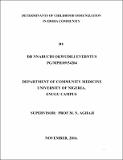- UNNSpace Home
- →
- Faculty of Law
- →
- Law
- →
- Theses and Dissertations (Law)
- →
- View Item
JavaScript is disabled for your browser. Some features of this site may not work without it.
| dc.contributor.author | Nnabuchi, Okwudili Everntus
|
|
| dc.date.accessioned | 2017-06-06T10:11:26Z | |
| dc.date.available | 2017-06-06T10:11:26Z | |
| dc.date.issued | 2017-06-06 | |
| dc.identifier.uri | http://hdl.handle.net/123456789/5302 | |
| dc.description.abstract | This study is a cross sectional study aimed at evaluating practice and determinants of child hood immunization in Idoha. This study is focused on identifying why children don’t receive immunization, and factor that encourage or deter immunization practice in the community. A total of 400 respondents were systematically selected from five villages in the community. Analysis showed that372 (98.2%) of babies had BCG. 354 (93.2%) had OPV and 348 (91.6%) had HBVO. Majority of mothers knows that immunization is for protection against child hood illness. Most families in this village live below one dollar per month income. This however didn’t affect immunization status as most mothers with good knowledge and positive perception have their children complete their immunization. There is no known religious or cultural factors that deter immunization rather they encourage immunization practice. | en_US |
| dc.language.iso | en | en_US |
| dc.subject | Childhood | en_US |
| dc.subject | Immunization | en_US |
| dc.subject | Vaccine Preventable Diseases | en_US |
| dc.subject | Mortality | en_US |
| dc.title | Determinants of Childhood Immunization in Idoha Community | en_US |
| dc.type | Thesis | en_US |
